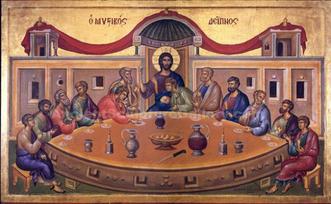“However, you are to eat whatever may be given you in a common refectory, listening together meanwhile to a reading from Holy Scripture, where that can be done without difficulty.”--The Rule, Chapter 7

This chapter does seem out of place. What are we to do with the “however,” clause which has absolutely nothing to do with the preceding chapter on the establishment of a “separate cell”? Or, if we take a moment to pause, does it actually relate to the brothers having separate cells? Is the Rule, not Albert since this chapter is part of the mitigation that came after the Order’s move to Europe, suggesting that while the brothers are to each have a separate cell, in which they spend most of their time at or in, they are not to eat their meals in their individual cells? Is the Rule, by its placement saying: You will have your own dwelling, ‘however,’ you will come together to join in a common meal, and you will eat common food while listening to the common Word? If so, then is this a profound chapter on the source of unity and understanding of community; that we are brought together at the Table where one meal is served and one Voice proclaimed?
Our meals are not to be ordered from a varied selection. Neither will this table community be broken up into competing and isolating conversations. Rather, our meal table is the Lord’s table, where He gave us One meal, One bread which is Himself, and where we share in one meal, one food without complaint. As Jesus took the bread, blessed it, gave thanks, and gave it to the brothers, so too do we take our food, bless it, give thanks to God and give it to the brothers to eat, who receive it just as the disciples received the food given to them by Christ. They then listened to the Word as they ate: “Drink from it, all of you, for this is my blood of the covenant, which will be shed on the behalf of many for the forgiveness of sins. I tell you, from now on I shall not drink this fruit of the vine until the day when I drink it with you in the kingdom of my Father.” (Mt. 26:27-29)
As we listen to the reading of Holy Scripture, we too are listening to the Word of God as we eat, and so in our ordinary food, daily share that very same meal and table, not merely at the time of liturgy and celebration of the Eucharist, but within the midst of our daily life. In this way, we continue to live out daily that reflection of the mystical supper at the heavenly table in the small way that our earthly life tastes the resurrection that awaits, and so our entire life becomes that much more a celebration and living experience of Christ.
It should be noted that it is my experience that our houses have completely abandoned the practice of table reading. Instead, our meals have become time to catch up on the day’s events and bond socially with one another. How much stronger though is the bond of the Eucharist, and to be reminded toward the end of each day, not only who it is that we are participating in, but in whom we are bound and joined together so much more intensely and intimately than any social gathering can do? Perhaps we should consider taking one or two nights each week to renew this tradition and practice, to bring the Eucharist back into our daily meals and remember our Lord sitting alongside this table, handing the food to his disciples that they did not want to eat.
As we listen to the reading of Holy Scripture, we too are listening to the Word of God as we eat, and so in our ordinary food, daily share that very same meal and table, not merely at the time of liturgy and celebration of the Eucharist, but within the midst of our daily life. In this way, we continue to live out daily that reflection of the mystical supper at the heavenly table in the small way that our earthly life tastes the resurrection that awaits, and so our entire life becomes that much more a celebration and living experience of Christ.
It should be noted that it is my experience that our houses have completely abandoned the practice of table reading. Instead, our meals have become time to catch up on the day’s events and bond socially with one another. How much stronger though is the bond of the Eucharist, and to be reminded toward the end of each day, not only who it is that we are participating in, but in whom we are bound and joined together so much more intensely and intimately than any social gathering can do? Perhaps we should consider taking one or two nights each week to renew this tradition and practice, to bring the Eucharist back into our daily meals and remember our Lord sitting alongside this table, handing the food to his disciples that they did not want to eat.

 RSS Feed
RSS Feed